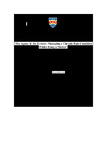‘The Agony & the Ecstasy: Managing a Chronic Pain Condition Whilst Being a Mother’
| dc.contributor.supervisor | Stedmon, Jacqui | |
| dc.contributor.author | Chapman-Moyle, Movita | |
| dc.contributor.other | Faculty of Health | en_US |
| dc.date.accessioned | 2021-11-01T15:57:07Z | |
| dc.date.available | 2021-11-01T15:57:07Z | |
| dc.date.issued | 2021 | |
| dc.identifier | 10447003 | en_US |
| dc.identifier.uri | http://hdl.handle.net/10026.1/18197 | |
| dc.description.abstract |
Persistent pain is a debilitating condition affecting more women than men, and for women in their child-rearing years this means struggling to bring up children whilst contending with an unforgiving pain condition. Existing research in this area has found increased levels of pain complaints in children of mothers with persistent pain, raising the risk of them developing some form of pain in later years. A primary aim of this research was to investigate ways attachment influences pain development in children of maternal persistent pain sufferers. Additionally, the aim was to investigate how transmission of pain behaviour, including the experience of pain and coping strategies, is influenced by whether mothers suffer with pain with a medically acknowledged aetiology, such as rheumatoid arthritis (RA), compared to more contested aetiology, such as fibromyalgia (FMS). Mothers with children aged between 5-16, were recruited via national pain organisations and via social media, completed standardised questionnaires, five participated in attachment interviews, parenting interviews, and their children engaged in child attachment interviews All five women described how their pain condition was an emotional and practical challenge, and had childhood histories indicating difficulties in dealing with their lives and pain. In turn, these impacted on their parenting, meaning four of the five cases indicated considerable risks to the future development of their children. Differences in pain aetiology were not related to attachment styles, nor the expression of either maternal or child pain. Four of the five mothers reported providing physical care when their children were in pain or distress, one, whose pain was relatively well managed, reported providing comfort for her child when ill. Conversely, none of the children reported receiving comfort or nurturing when ill. Clinical implications include a need not just for individual but also for family based therapies for women with persistent pain and their children. | en_US |
| dc.language.iso | en | |
| dc.publisher | University of Plymouth | |
| dc.subject.classification | PhD | en_US |
| dc.title | ‘The Agony & the Ecstasy: Managing a Chronic Pain Condition Whilst Being a Mother’ | en_US |
| dc.type | Thesis | |
| plymouth.version | publishable | en_US |
| dc.identifier.doi | http://dx.doi.org/10.24382/595 | |
| dc.rights.embargoperiod | No embargo | en_US |
| dc.type.qualification | Doctorate | en_US |
| rioxxterms.version | NA |
Files in this item
This item appears in the following Collection(s)
-
01 Research Theses Main Collection
Research Theses Main


